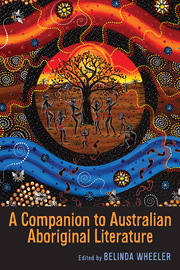Book contents
- Frontmatter
- Contents
- Foreword
- Acknowledgments
- Chronology
- Introduction: The Emerging Canon
- 1 Indigenous Life Writing: Rethinking Poetics and Practice
- 2 Australian Aboriginal Life Writers and Their Editors: Cross-Cultural Collaboration, Authorial Intention, and the Impact of Editorial Choices
- 3 Contemporary Life Writing: Inscribing Double Voice in Intergenerational Collaborative Life-Writing Projects
- 4 European Translations of Australian Aboriginal Texts
- 5 Tracing a Trajectory from Songpoetry to Contemporary Aboriginal Poetry
- 6 Rites/Rights/Writes of Passage: Identity Construction in Australian Aboriginal Young Adult Fiction
- 7 Humor in Contemporary Aboriginal Adult Fiction
- 8 White Shadows: The Gothic Tradition in Australian Aboriginal Literature
- 9 Bold, Black, and Brilliant: Aboriginal Australian Drama
- 10 The “Stolen Generations” in Feature Film: The Approach of Aboriginal Director Rachel Perkins and Others
- 11 A History of Popular Indigenous Music
- Notes on the Contributors
- Index
6 - Rites/Rights/Writes of Passage: Identity Construction in Australian Aboriginal Young Adult Fiction
Published online by Cambridge University Press: 05 September 2013
- Frontmatter
- Contents
- Foreword
- Acknowledgments
- Chronology
- Introduction: The Emerging Canon
- 1 Indigenous Life Writing: Rethinking Poetics and Practice
- 2 Australian Aboriginal Life Writers and Their Editors: Cross-Cultural Collaboration, Authorial Intention, and the Impact of Editorial Choices
- 3 Contemporary Life Writing: Inscribing Double Voice in Intergenerational Collaborative Life-Writing Projects
- 4 European Translations of Australian Aboriginal Texts
- 5 Tracing a Trajectory from Songpoetry to Contemporary Aboriginal Poetry
- 6 Rites/Rights/Writes of Passage: Identity Construction in Australian Aboriginal Young Adult Fiction
- 7 Humor in Contemporary Aboriginal Adult Fiction
- 8 White Shadows: The Gothic Tradition in Australian Aboriginal Literature
- 9 Bold, Black, and Brilliant: Aboriginal Australian Drama
- 10 The “Stolen Generations” in Feature Film: The Approach of Aboriginal Director Rachel Perkins and Others
- 11 A History of Popular Indigenous Music
- Notes on the Contributors
- Index
Summary
Arite of passage is an experience that triggers a significant transformation. During the journey an individual crosses a border or boundary and is transformed in a way that empowers him or her to live in the world differently than before. A genre in Aboriginal writing that often traces a main character's journey from adolescence to adulthood is young adult fiction. Three prolific Aboriginal young adult fiction writers are John Muk Muk Burke, Melissa Lucashenko, and Tara June Winch. This chapter will look at the bildungsroman in Aboriginal writing through the works of these three authors with particular attention to identity construction, belonging, and the search for a sense of place for the young Aboriginal protagonists in late twentieth- and early twenty-first-century Australia. Though the dominant literary canon in Australia still mainly views identity construction in terms of the Enlightenment concept of the individualist, the Aboriginal bildungsroman focuses on belonging and a sense of place as integral and essential parts of identity construction.
Much of the literature that is emerging in the Aboriginal young adult genre centers on cultural as well as individual identity, usually in urban settings where the majority of Australia's Aboriginal population now lives. The characters in Burke's, Lucashenko's, and Winch's narratives demonstrate how contemporary Aboriginal identity is lived in Western contexts, yet this identity still remains distinct from Australian settler culture.
- Type
- Chapter
- Information
- A Companion to Australian Aboriginal Literature , pp. 107 - 124Publisher: Boydell & BrewerPrint publication year: 2013



